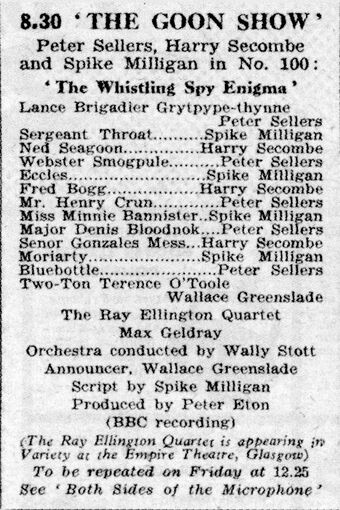The Whistling Spy Enigma
| "The Whistling Spy Enigma" | |
|---|---|
| The Goon Show episode | |
 | |
| Episode: no. | Series: 5 Episode: 1 |
| Written by | |
| Announcer | Wallace Greenslade |
| Produced by | Peter Eton |
| Music |
|
| Recording Number | TLO 62960 |
| First broadcast | 28 September 1954 |
| Running time | 30:41 |
The Whistling Spy Enigma is an episode from The Goon Show. It was the first show in series five. It was recorded on Sunday 26 September 1954 at 9pm. It was recorded at The Paris Cinema, 12 Lower Regent Street in central London.
The first Home Service broadcast was on Tuesday 28 September 1954 at 8.30pm. It attracted a peak listenership of 2.6m listeners.
| Day | Date | Time | Ratings | Station | Show |
|---|---|---|---|---|---|
| Friday | 1 October 1954 | 12.25pm | 1.5m | Home Service | |
| Friday | 29 April 1955 | 7.30pm | 3.4m | Light Programme | |
| Tuesday | 30 August 1977 | 10.30pm | 0.4m | Radio 4 | in The Golden Oldies |
| Monday | 27 May 1991 | 7.02pm | Radio 2 | ||
| Monday | 20 December 1993 | 11.30pm | 0.4m | Radio 4 | in Spike's Pick of the Goons |
Story
The story begins as a young Ned Seagoon is sent to go behind the Iron Curtain in order to sabotage the Hungarian national football team, the aim being to assure a revival of Britain's sporting prestige over the next football season. The action takes place at a stadium near Budapest, at a British Embassy Haywards Heath, a haddock stretching factory in Petrograd and outside a deserted maternity home in Mayfair.
Music
- The BBC Radio Orchestra was conducted by Wally Stott
- Max Geldray plays I Don't Know Why (Roy Turk / Fred Ahlet)
- The Ray Ellington Quartet plays ABC Boogie (Max Spickol / Al Russell)
Technical
Originally recorded on TLO 62960 (15 ips ¼" tape recorded at Broadcasting House).
Ted Kendall's Restoration
This tape was copied before transmission through a notch filter to remove a whistle on the line between The Paris Cinema and the recording channel in Broadcasting House. The version included on Compendium Vol 1 was sourced from the Sound Archive shelf copy (T28575) (a 15 ips ¼" tape) and was dubbed to DAT in 1990.